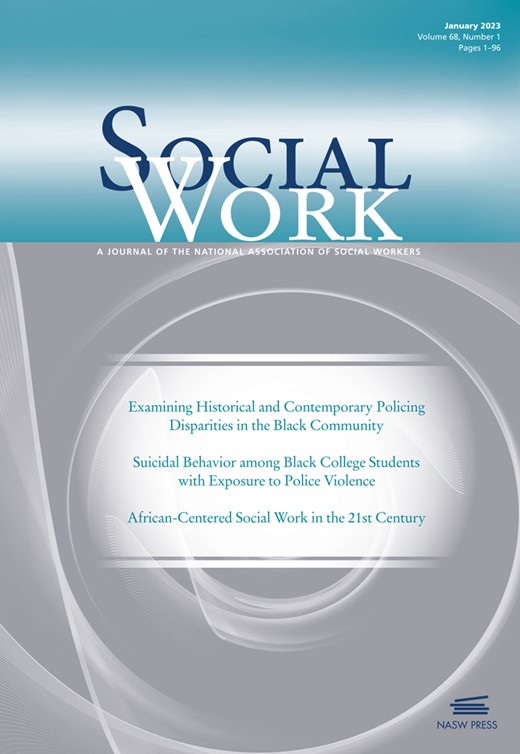The January 2023 issue of the journal Social Work is now online. NASW members can read Social Work journal online.
Here are some of the articles in this issue:
Beyond Ramps, Curb Cuts, and Captions: A Call for Disability Justice in Social Work
Despite decades of advocacy, Disabled people continue to experience ableism—such as inaccessibility, stigma, and exclusion—in all realms of social work. Additionally, when speaking of “Disability culture,” it is inclusive of neurodivergence, chronic illness, chronic pain, mental illness, madness, and so forth. Disabled social work professionals and accomplices call on nondisabled colleagues to develop their Disability cultural competence and to make inclusion and anti-ableism priorities in our field.
On the Frontlines: The Impact of the COVID-19 Pandemic on Social Workers’ Well-Being
The crisis created by the spread of COVID-19 brought increasing needs and referrals to social welfare services in many countries. However, at the same time, social services suffered from staff cutbacks and service closures, resulting in significant workload increases to address the hardships associated with the pandemic. This article investigates the impact of the COVID-19 pandemic on Israeli social workers’ well-being, using a mixed-methods design with a sample of 2,542 licensed social workers.
Quiet Quitting
While definitions vary, they all agree that in quiet quitting, one does not literally quit one’s job, but rather simply does the work that is expected of the position, without going above and beyond. This phenomenon, first noted on TikTok, has become widespread. A recent Gallup poll found that quiet quitters made up over one half of U.S. employees in the second quarter of 2022.
Predicting Intimate Partner Violence Reassault and Homicide: A Practitioner’s Guide to Making Sense of Predictive Validity Statistics
A key issue for social workers intervening with clients who use or experience intimate partner violence (IPV) is understanding the likelihood of future re-assault and potential lethality. IPV risk assessments (IPVRAs) have been developed to predict future assault among people who have perpetrated IPV. This practice update aims to help social work practitioners make sense of IPVRA predictive validity using intimate partner homicide as an example outcome.
An Examination of Suicidal Behavior among Black College Students with Exposure to Police Violence
There is limited research about suicidal behaviors among Black emerging adults (peak age of suicide risk) who report exposure to police violence. The current study applies an integrated approach to examine individual, immediate environment, and community-based risk and protective factors of suicide among Black college students who reported previous exposure to police violence.
Brokering Resources during a Pandemic: Exploring How Organizations and Clinics Responded to the Needs of Immigrant Communities during COVID19
Though COVID-19 has had sweeping implications, many immigrant groups in the United States have been disproportionately affected. The purpose of the present study is to explore the impact of COVID-19 on immigrant communities and how local immigrant-serving organizations (ISOs) have responded during the pandemic.
Examining Historical and Contemporary Policing Disparities in the Black Community: Implications for Social Work
An alarming number of unarmed Black men and women have been killed by police in the United States. This article conducts a critical analysis of the extant literature on historical and contemporary policing in the Black community and identifies linkages between these time periods using critical race theory.
Forget the “Five Stages”: Ask the Five Questions of Grief
Grief scholars, theorists, and well-attuned practitioners regard Kübler-Ross’s “five stages of grief” as misinformation with negative effects. In her original work, Kübler-Ross (1969) described the experiences of dying people as a trajectory, not stages. This commentary suggests an alternate approach.
Social Work and Social Justice: A Conceptual Review
This study examines how social justice has been operationalized in social work via a conceptual review of the literature. Findings show that social work leans heavily on John Rawls’s definition of social justice, Martha Nussbaum’s and Amartya Sen’s capabilities approach, and the definition of social justice included in The Social Work Dictionary. Unfortunately, none of these adequately align with the National Association of Social Workers’ Code of Ethics, which drives the profession. This conceptual review is a call to social workers to join together in defining the guiding principle of the profession.
African-Centered Social Work in the 21st Century: A Content Analysis
This study sought to examine to what extent the African-centered framework is included within scholarship among prominent social work journals. A content analysis was conducted of articles in six major social work journals published between 2000 and 2019. A total of 42 articles met the criteria for inclusion. While there has been a level of change in the number of published articles of African-centered social work, findings suggest that relative to other practice modalities/models, African-centered scholarship is noticeably lacking in social work literature.
The Experiences of Caretaking and Financial Stress among Social Workers during the COVID-19 Pandemic
Social workers have engaged in promotive, preventive, and intervention work throughout the COVID-19 pandemic. Given that social workers are disproportionately women, and the essential nature of practice during the pandemic, how social workers experience caretaking and financial stressors warrants examination. Data are drawn from a larger cross-sectional survey of U.S.-based social workers (N = 3,118) conducted from June to August 2020.




